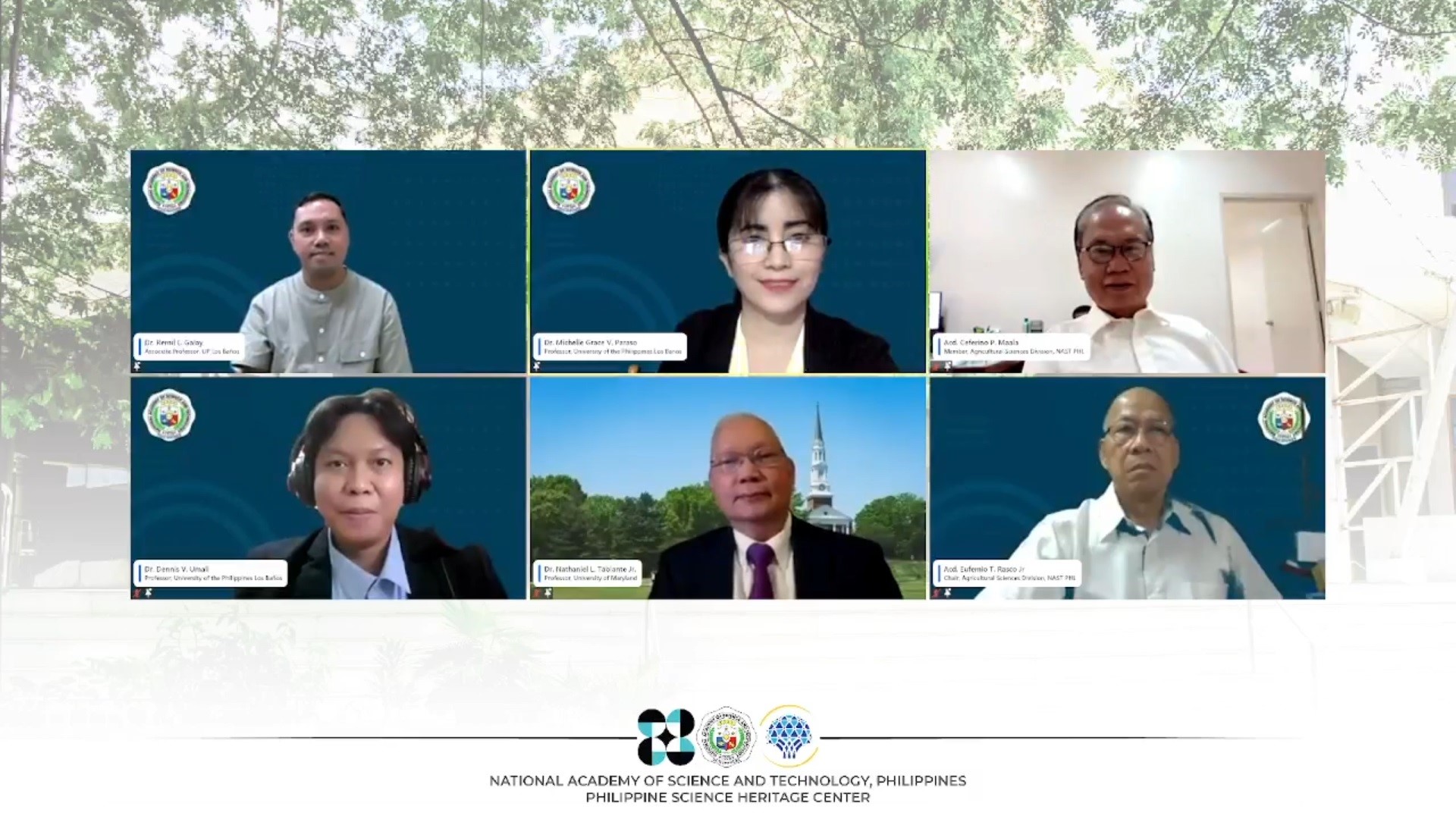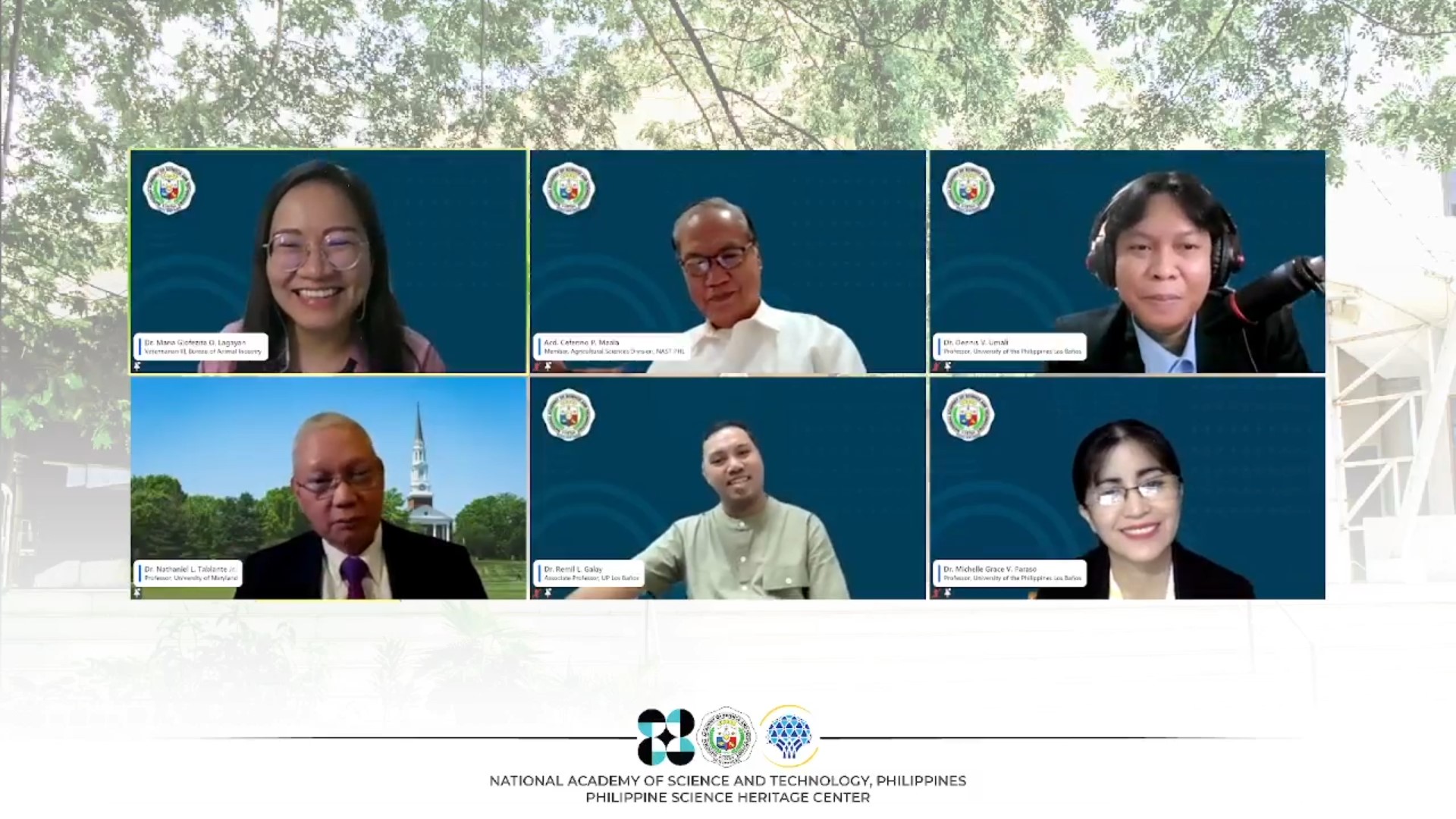Bicutan, Taguig City – The National Academy of Science and Technology, Philippines (NAST PHL) held a Science Policy and Information Forum on Bird Flu last 18 May 2022.
Recurrence of Avian flu (H5N6) outbreak in the Philippines was confirmed by the Bureau of Animal Industry on July 10, 2020 in a commercial layer farm in Pampanga, and in Rizal on August 20, 2020 in a backyard farm of 500 head free-range chicken and 300 ducks. On January 8, 2021, World Organization for Animal Health (OIE) declared that the Philippines is now free of the last remaining A (H5N6) strain of Avian influenza. Sadly, on March 8, 2022, 8 confirmed new Bird flu outbreaks have been recorded from the southern part of Luzon involving 2,000 quails and ducks. In addition to this, bird flu outbreaks have been confirmed in Pampanga, Bulacan and Laguna.
Because of these recent Bird flu outbreaks and also that the disease is of public health concern, this webinar is important in finding out what preventive measures have already been undertaken here and abroad to control the spread and recurrence of avian influenza.
Acd. Ceferino P. Maala, NAST PHL focal person on bird flu, briefly discussed the different types of bird flu and emphasized the need to put forward science-based policy recommendations to address the gaps in containing the spread and recurrence of bird flu in the country and to improve policy implementation.
Dr. Dennis V. Umali, professor at the Department of Veterinary Clinical Sciences, College of Veterinary Medicine, University of the Philippines Los Baños, presented an overview of the highly pathogenic avian influenza in the Philippines. His lecture focused on the recent outbreaks of the disease around the world and in the country, important aspects about the disease such as incubation period, sources of the virus, viral genome, and serotype distribution or the groupings of related microorganisms. He noted the types of transmission as well as contextual information and clinical symptoms and perceived pathways of avian influenza in the Philippines.

Invited speakers and panelists for the Science Policy and Information Forum on Bird Flu. First row (From left to right): Dr. Remil L. Galay, OYS 2020; Dr. Michell Grace V. Paraso, OYS 2012; Acd. Ceferino P. Maala Second row: Dr. Dennis V. Umali, OYS 2015; Dr. Nathaniel Tablante; Acd. Eufemio T. Rasco Jr. Academicians Maala and Rasco are members of the NAST PHL Agricultural Sciences Division.
Dr. Nathaniel Tablante Jr., professor at the University of Maryland, highlighted the prevention and control strategies against avian influenza implemented in the United States. In his talk, Dr. Tablante shared the rationale behind the rapid response of the US Department of Agriculture to the highly pathogenic avian influenza, which is anchored on epidemiological principles.
He shared the US’ rapid response or stamping out policy consisting of quarantine, emergency management of the disease through depopulation, disposal of infected flocks, and strategic emergency vaccination as well as the dissemination of evidence-based information on avian flu to stakeholders.
Some issues and concerns that were raised during the open forum centered on the implications of climate change on the infection, safety of poultry products, and issues on free ranging farms. Dr. Tablante also shared lessons learned from previous disease outbreaks in the US with regard to the spread of the disease and how planning and preparedness is the key to control such outbreaks.

Second row: Dr. Nathaniel Tablante; Dr. Remil L. Galay OYS 2020; Dr. Michelle Grace V. Paraso, OYS 2012.
The forum, which was conducted through Zoom and livestreamed in the NAST PHL Facebook page, was moderated by Dr. Remil L. Galay, Outstanding Young Scientist 2020, while Dr. Michelle Grace V. Paraso, Outstanding Young Scientist 2012, provided the synthesis of the program.
A press conference was conducted right after the forum, which was moderated by Dr. Maria Glofezita O. Lagayan, Veterinarian III of the National Veterinary Quarantine Services Division at the Bureau of Animal Industry
The questions raised during the press conference mostly refer to breeding chickens that are resistant to bird flu virus, animal-to-human transmission, and safety of consuming infected poultry. Dr. Tablante and Dr. Umali answered that cooking the product thoroughly will kill the virus.
Acd. Jaime C. Montoya, an infectious disease expert, emphasized that humans can only be infected with bird flu through human respiratory routes. In terms of mortality, however, bird flu can be fatal for some who have underlying conditions or are immunocompromised. (Janpherson Lapuz/NAST PHL).
The National Academy of Science and Technology, Philippines (NAST PHL) is an attached agency to the Department of Science and Technology (DOST) mandated by law (Executive Order 818 s.1982) to serve as adviser to the President of the Republic of the Philippines and the cabinet on policies concerning science and technology in the country. For more updates, follow NAST Philippines’ (@nastphl) social media accounts.











